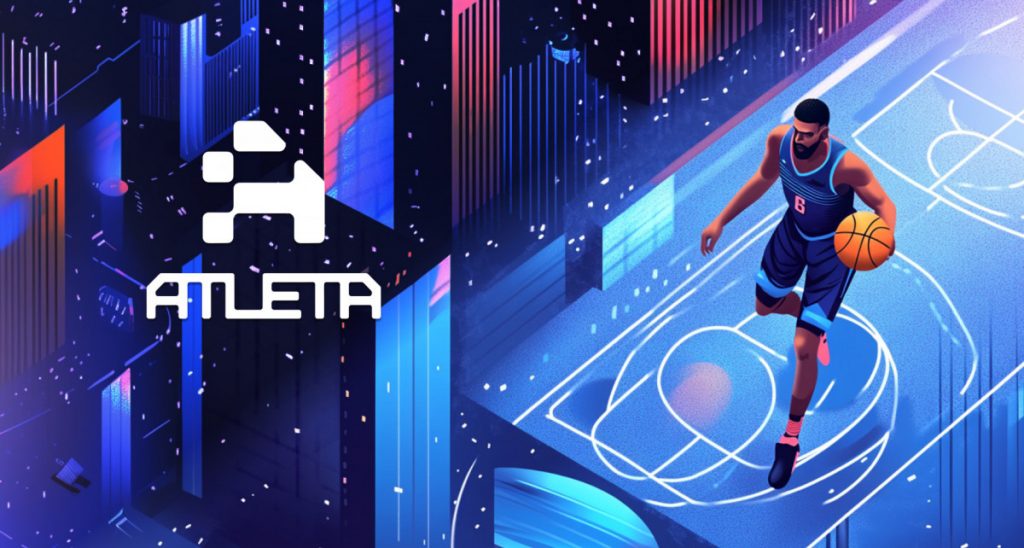Atleta Unveils Sports-Focused Blockchain Stack To Tokenize Assets And Modernize The Industry


In Brief
Atleta is building a Layer 1 sports-focused blockchain to digitize assets, enable cross-chain applications, and transform traditional sports markets into programmable, transparent infrastructure.

Layer 1 sports-focused blockchain, Atleta released an overview of its infrastructure stack designed to digitize sports, convert analog assets into tokenized forms, and make traditionally private sports markets accessible to the public. The platform serves clubs, leagues, athletes, and game studios with a Layer 1 blockchain and tools tailored for decentralised finance (DeFi), non-fungible tokens (NFTs), and GameFi. Developed using Substrate and Rust, the EVM-compatible network combines security and decentralization with developer familiarity, while supporting permissionless participation and on-chain governance.
The sports industry is increasingly moving toward digital solutions on systems not originally built for it, with contracts and image rights still managed via PDFs and ticketing and merchandise processed through expensive intermediaries. Clubs face challenges in transforming analog assets such as archives, event data, and loyalty programs into programmable products. While fan tokens offered a potential blockchain-based solution five years ago, they have not increased revenue or enhanced fan engagement. The industry now requires an infrastructure-first approach that establishes foundational systems before focusing on rewards. This next phase emphasizes core infrastructure in a market projected to expand from approximately $2 billion today to $10 billion by 2035.
Substantial progress is emerging from sports-native blockchains capable of tokenizing real assets—including ticket sales, sponsorship contracts, and event data—and converting them into programmable components that integrate with DeFi, GameFi, and NFT ecosystems.
Atleta embodies this comprehensive approach, aiming to lay the groundwork for a more efficient and accessible digital sports economy.
Dima Saksonov, CEO and Founder of Atleta, highlighted in a commentary to Mpost how Atleta plans to overcome the adoption barrier with traditional sports organizations, many of which remain hesitant to digitize their assets, and the role partnerships with leagues, clubs, and federations will play in accelerating this transition.
According to him, the numbers are the most compelling argument. When clubs and federations see tangible growth in fan engagement, revenue, and favorable deals, they begin to view blockchain as a genuine opportunity rather than something to approach cautiously. While transparency in player health and performance statistics, fan participation, and efforts to combat corruption are important narratives, presenting them in measurable terms provides a stronger incentive for blockchain adoption.
“All existing and upcoming partnerships will give us these numbers to promote widespread use of blockchain in sports. We are not alone in this optimism: the blockchain in sports market, currently valued at $2B, is expected to surge to at least $10B over the next decade. Atleta is ready to lead this expansion,” he said to Mpost.
Atleta’s Sports-Focused Blockchain Stack Enables Digital Asset Ownership, Interoperability, And Market Efficiency
Atleta’s mission centers on modernizing the sports industry and reshaping market structures through next-generation digital applications. At the execution level, the Atleta Layer 1 blockchain runs EVM-compatible smart contracts on a Substrate runtime compiled to WASM, facilitating Solidity migration while retaining a Rust/INK option for advanced development. Its interoperability layer enables cross-chain transfer of assets and data through bridges and messaging, while a storage layer supports decentralized media and structured data, anchoring match footage, ticketing records, and event metadata.
Core decentralized applications, including staking, governance, a decentralized exchange, and a bridge, are being deployed gradually to provide foundational functionality. A native Blockchain Sports Marketplace manages primary and secondary sales of sports-linked digital assets. The platform’s tooling and infrastructure include blockchain explorers, faucets, testnets, software development kits, grants, and an ambassador program.
The network operates on a Nominated Proof-of-Stake model that separates block production from finalization, with BABE generating blocks and GRANDPA finalizing them, achieving approximately six-second block times and around 80 transactions per second. Atleta is designed to integrate with major ecosystems from launch, including Ethereum, Polkadot, Arbitrum, and Polygon.
Atleta’s advantage lies in its sports-specific, modular architecture, capable of managing compliant real-world assets, identities, and event data without requiring individual integrations for each club or league. Developers can deploy Solidity applications directly via EVM or utilize the Rust/INK pathway on Substrate for more customized solutions. Its interoperability-first design facilitates asset and data movement across chains, while the native marketplace centralizes primary and secondary trading to prevent fragmentation. The network’s low fees and fast finality enhance user experience and transaction efficiency.
For sports organizations, the platform enables verifiable digital ownership, transferable fan rewards, and auditable media or match data that can be reused across multiple products. For developers, it reduces infrastructure setup time and expands reach through cross-chain connections and a unified marketplace. To support this ecosystem, Atleta operates an ATLA-funded Grants Program providing $2,500–$200,000 in milestone-based funding, along with hands-on guidance and marketing support post-launch. To date, six projects have been selected, with approximately 30 applications under review.
“We view blockchain as a tool to level up the sports industry, not as a goal in itself. That’s why we’re aiming to hide as much tech under the hood as possible, so users and sports organizations can enjoy the benefits of blockchain without being confused by its complexity,” said Dima Saksonov to Mpost. “This means building intuitive interfaces that non-Web3 natives can easily use. Our goal is to deliver tangible value, and it won’t be diminished by technical difficulties,” he added.
He further highlighted a use case: on-chain ticketing. This segment is already expanding, with projections indicating growth from $0.75 billion to $3.75 billion in the coming years.
“In a recent survey we conducted in our community, half of the users said they would like to see decentralized ticketing among the next features launched on Atleta. The demand is already here; the ball is now on the sports organizations’ side to meet it,” noted Dima Saksonov.
Atleta Outlines Roadmap To Transform Sports Market With ATLA Token And Scalable Blockchain Infrastructure
On August 17th, Atleta completed a community-supported token generation event for ATLA, the native token that powers gas fees, governance, and staking on the network, alongside a listing on MEXC. The launch attracted primarily participants from the sports sector rather than typical cryptocurrency speculators. Following the mainnet debut, Atleta reported over one million active users and 24 million transactions.
The Atleta team plans to launch on decentralized exchanges and Tier-2 centralized exchanges later this year, alongside the introduction of liquidity grants and a bug bounty program to strengthen network security. The project will expand its DeFi partnerships, host a community hackathon, and integrate lending protocols to enhance on-chain utility.
In the fourth quarter of 2025, focus will shift to data management and distribution, with the deployment of a data-storage testnet and onboarding of a legacy data provider to convert historical records and media into an on-chain format. The roadmap anticipates Tier-1 exchange listings, a second token airdrop, publications codifying best practices under “SportFi,” a “Data Rush” community event, and the storage layer mainnet launch in the first quarter of 2026. The second quarter of 2026 emphasizes scaling and engagement, including a parallelized virtual machine for mainnet and a network-wide points system to reward participation.
In Q3 2026, Atleta plans to expand its go-to-market strategy with an affiliate program and APIs enabling clubs, leagues, and federations to connect their applications to the chain. Regional expansion across Asia, Latin America, and MENA is scheduled for Q4 2026, supported by the Atleta Cup and local Web3 and sports partnerships. The year 2027 will focus on further brand collaborations and the integration of ATLA into payment systems, with future initiatives including AI-driven applications, decentralized data projects, and a World Drift Championship featuring AI-operated vehicles.
If successfully executed, Atleta could transition elements of the sports market from private ledgers to transparent, programmable infrastructure by supporting compliant real-world assets, richer data products, and cross-chain applications that meet fans where they already engage. Reflecting on five years since the introduction of fan tokens, it is evident that while they added engagement, they did not transform the underlying infrastructure. The next phase emphasizes foundational systems—identity, rights, data, and payments—that sports organizations can rely on and developers can build upon, allowing tokens to function as integral components of a broader ecosystem rather than standalone attractions.
Commenting on how Atleta envisions its role in shaping the broader “SportFi” landscape, the CEO and Founder of Atleta noted that Atleta aims to bring transparency and trust to the sports industry. Traditionally, sports operations have been opaque, with performance data restricted, health records unclear, transfers concealed, and fans navigating fake tickets and unreliable intermediaries. Atleta seeks to reverse this model by ensuring data is verified, transactions flow directly, and trust is established from the ground up.
“Our storage layer secures performance metrics, media, and even sensitive medical data while keeping it private. This unlocks transparent analytics for clubs, control for athletes, and authentic experiences for fans. Atleta is shaping SportFi with protected athlete metrics, digital assets for engagement, and transparent transactions,” Dima Saksonov said to Mpost. “For clubs and athletes, this unlocks entirely new revenue streams — verified ticketing, tokenized media, fan interactions, and secure monetization of performance data. Instead of losing value to middlemen, they can connect directly with fans and sponsors, turning trust and transparency into sustainable income. In short, Atleta turns what used to be costs and risks into long-term upside,” he concluded.
Disclaimer
In line with the Trust Project guidelines, please note that the information provided on this page is not intended to be and should not be interpreted as legal, tax, investment, financial, or any other form of advice. It is important to only invest what you can afford to lose and to seek independent financial advice if you have any doubts. For further information, we suggest referring to the terms and conditions as well as the help and support pages provided by the issuer or advertiser. MetaversePost is committed to accurate, unbiased reporting, but market conditions are subject to change without notice.
About The Author
Alisa, a dedicated journalist at the MPost, specializes in cryptocurrency, zero-knowledge proofs, investments, and the expansive realm of Web3. With a keen eye for emerging trends and technologies, she delivers comprehensive coverage to inform and engage readers in the ever-evolving landscape of digital finance.
More articles

Alisa, a dedicated journalist at the MPost, specializes in cryptocurrency, zero-knowledge proofs, investments, and the expansive realm of Web3. With a keen eye for emerging trends and technologies, she delivers comprehensive coverage to inform and engage readers in the ever-evolving landscape of digital finance.



















































